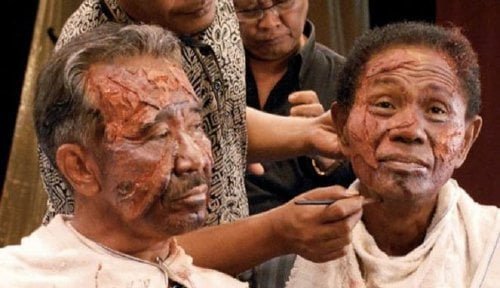The Act of Killing

In October of 1965, the Sukarno government in Indonesia was overthrown in a military coup and the rule of the country fell to the right-wing generals. The first item on their political agenda is the total destruction of all communists in their country. To do this, the gangsters of Indonesia’s criminal underworld are secretly hired to perform the gruesome, and many, killings. These self admitted murderers freely discuss and reenact “The Act of Killing.”
Laura's Review: A-
In 1965, anti-colonialist Indonesian President Sukarno was overthrown by a military coup supported by Western nations. Anyone who disagreed with the military dictatorship was labelled a communist and one million Indonesians were killed by death squads. Anwar Congo was a movie loving small time gangster who became one of these squads' leaders, killing hundreds with his own hands. Far from being condemned, he and his ilk are still celebrated today. Joshua Oppenheimer invited Anwar and his colleagues to recreate this genocide in the style of their favorite movies and he and his codirectors Christine Cynn and an anonymous Indonesian student documented this process with all its horrifying and surprising results as "The Act of Killing." Earlier this year, Sarah Polley took an entirely new approach to the documentary format with her "Stories We Tell." Now Oppenheimer does the same, kicking off an experiment that places recreations in the hands of its cinema obsessed perpetrators. But while Polley's work was highly personal, Oppenheimer goes for global, connecting the Indonesian 'banality of evil' with U.S. culture. That the Westerns, Musicals and Gangster films these former black market movie ticket sellers turned mass murderers create also provoke self-reflection in Anwar is an interesting phenomenon - the movies that inspired his favored killing method (he preferred a wire because there was less blood to clean up) also make him face the horrors he inflicted. And yet Anwar Congo may be the scariest person you'll see on screen this year. But that self reflection takes its time coming. The word 'surreal' will be bandied about endlessly in relation to this film, but it is the best descriptor. How can a nation exist in which the recreation of the burning of a 'commie house' done feet away from the original site complete with genuinely terrified women and children, some survivors of the actual event, draw a crowd of cheering spectators? Where an organization of 3 million called the Pancasila Youth embraces the legacy of the death squads? Where the Televisi Republik Indonesia can air a "Special Dialogue" news show about the films being created whose young female host admiriingly asks about the 'efficiency' of the killings? Where a newspaper publisher boasts that all he had to do was wink and people would be killed? Then there's the vision of Anwar's buddy Herman Koto, who appears in all these films in brightly hued drag. Oppenheimer's documentary is at its most chilling in early goings, when we see Anwar on the roof of a newspaper building where most of his deeds were done. He's completely matter-of-fact describing his acts, even talking about 'happy killing' after taking in Elvis movies. 'He's a happy man,' comments another as Anwar dances on the roof. But when Anwar sees this footage, he isn't shocked. Instead he decides he needs to dye his hair, dress more gangster-style and act grimmer. He casually watches some of his gangster footage with a young girl (a granddaughter?) curled at his feet. When one of their own is asked to portray a victim, he responds angrily, proudly protesting that he was a squad leader. Another victim is portrayed by a Chinese man who tells how his stepfather was murdered, carefully over-explaining that he is not condemning the filmmakers' acts. But it is here that cracks begin to form, admissions that 'Communists' were not the cruel ones, but they themselves. Should they really make this public? Later we witness Anwar in an uncontrollable fit of retching, trying to expectorate his guilt. The filmmakers don't go into much detail about foreign support, but the hints are there. Is it ironic that when Herman Koto decides to run for office he practices his public appearances with a television broadcast of Barrack Obama side by side with his mirror? (Oppenheimer explored this subject more in his earlier "The Globalization Tapes," which hopefully will receive greater exposure now.) If there is a fault with "The Act of Killing" it is in its length - eventually the film begins to wear us down. Yet with all the remarkable footage, it's hard to fault its inclusion. The films within the films are surprisingly adept, sometimes even beautiful ('Peace. Peace. Peace.' champion Anwar in a robe, surrounded by dancing girls at the bottom of a waterfall.) Oppenheimer chose a brilliant quote from Voltaire to open his film - “all murderers are punished unless they kill in large numbers and to the sound of trumpets.” - and it is what we're left to ruminate and despair over at film's end.
Robin's Review: B
I have never seen a documentary the likes of “The Act of Killing.” At first, it appears to be a straightforward documentary about the military dictatorship in Indonesia that ordered the murders of all communists (read: any opposition to the generals) at the hands of the gangsters. The center of this riveting document are the interviews with the officials that issued the orders and the men that carried them out as they tell the matter-of-fact story of two years of horror and brutality. However, “The Act of Killing” is much more as the filmmakers recruit the actual gangsters, elderly men now (personified by lead killer Anwar Congo and others), to stage and reenact their atrocities in any way they want – from simple, vivid reenactment to Hollywood-style costumed gangster drama. The result is chilling. There is no sense of remorse in these men for what they did to so many innocent people and that, too, is chilling.

